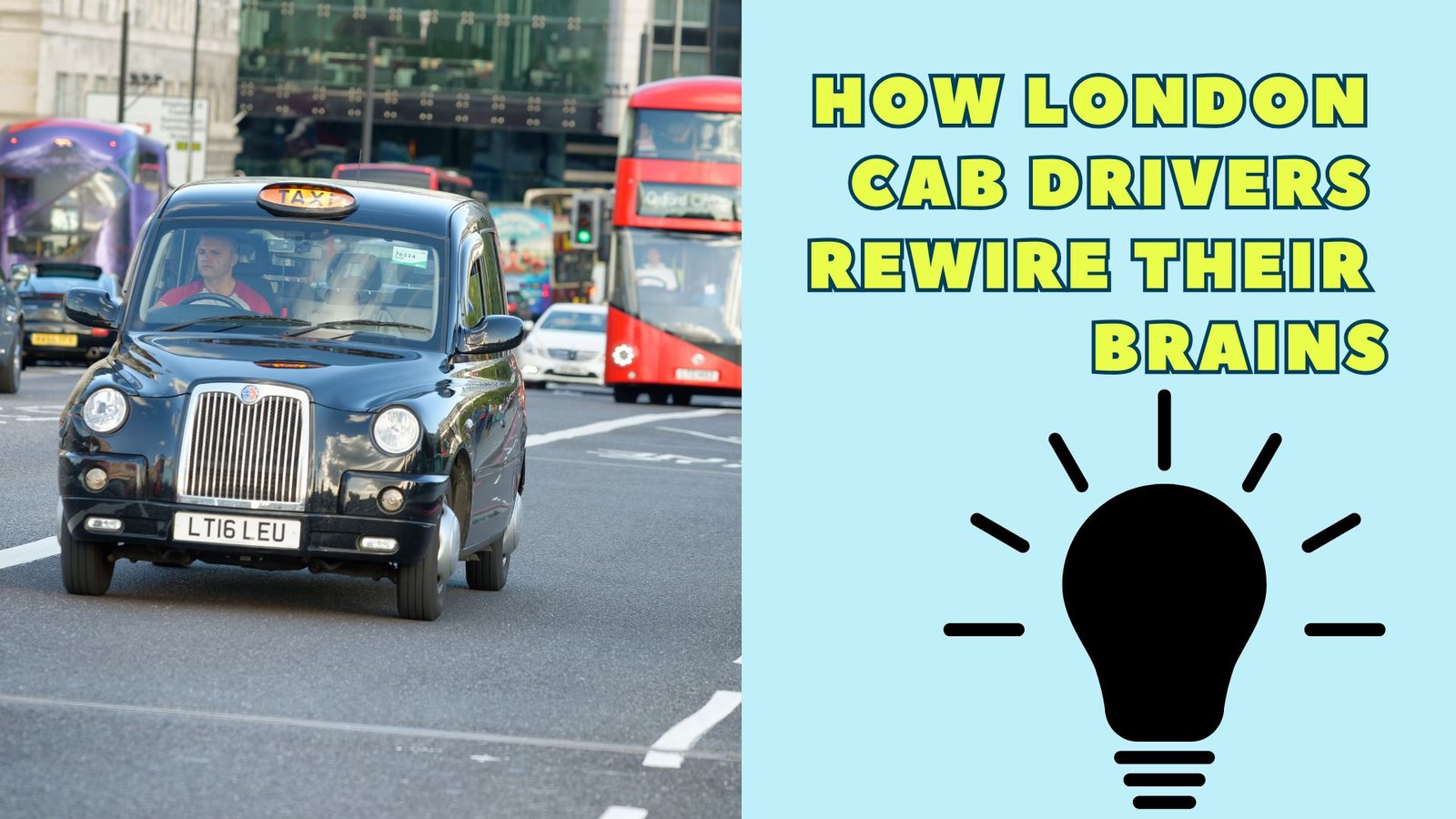Imagine being forced to memorize 25,000 streets, 20,000 landmarks, and 320 different routes—without ever using a map or GPS. That’s exactly what London cab drivers must do to earn their license in a grueling test called “The Knowledge.”
But here’s the shocking part: Their brains physically change.
Neuroscientists discovered that these cabbies develop enlarged hippocampi—the brain’s memory and navigation center—proving that learning isn’t just about absorbing facts, but reshaping your mind.
In this article, you’ll learn:
✔ Why traditional education fails at real learning
✔ How reading rewires your brain like a cab driver’s hippocampus
✔ The 3-step “Taxi Driver Method” to learn anything faster
✔ Why GPS (and Google) might be making you dumber
1. The Brain That Grew a City Inside It
In a landmark study, neuroscientist Eleanor Maguire scanned the brains of London cabbies and found something astonishing:
✅ Their posterior hippocampus (memory hub) was significantly larger than average.
✅ The longer they drove, the bigger it grew—like a muscle.
✅ Bus drivers (who follow fixed routes) showed NO such growth—proving active navigation, not passive memorization, builds intelligence.
What does this mean for learning?
→ Passive reading (like bus routes) = weak memory.
→ Active recall (like navigating London) = brain growth.
Also Read: How The Brain Functions While Speed reading
2. The “Taxi Driver Method” for Learning Anything
Cabbies don’t just memorize—they internalize the city. Here’s how to apply their strategy:
Step 1: Learn Like a GPS-Denied Explorer
- Problem: Most people read passively, like following GPS turn-by-turn.
- Solution: Read without highlights or notes first, then close the book and reconstruct key ideas from memory.
Example: After reading a chapter, ask:
- “What were the 3 big ideas?”
- “How would I explain this to a 10-year-old?”
Step 2: Build a “Cognitive Map” (Not a Flashcard Deck)
Cabbies don’t memorize streets—they build a 3D mental model.
- Bad learning: Rote repetition (flashcards).
- Elite learning: Connect ideas spatially (mind maps, storytelling)8.
Try this: After reading a book, draw a “street map” of its concepts—link chapters like intersecting roads.
Step 3: Stress-Test Your Knowledge
Cabbies must recall routes under pressure during brutal oral exams.
- Weak learners: Re-read passively.
- Strong learners: Self-test constantly (e.g., “Can I teach this?”).
Pro tip: Use the Feynman Technique—explain complex topics in simple terms until you uncover gaps.
3. Why Reading More Books Isn’t Enough (Unless You Do THIS)
A shocking finding: Taxi drivers were worse at memorizing new visual information—their brains optimized for deep mastery, not shallow multitasking.
This explains why most “readers” don’t get smarter:
- ❌ Binge-reading 100 books a year = bus driver brain (fixed routes).
- ✅ Mastering 10 books with active recall = cabbie brain (dynamic intelligence).
Elon Musk’s version: “I don’t just read—I apply knowledge like an engineer building a mental prototype.”
4. The Dark Side: How GPS (and Google) Are Shrinking Your Brain
A Harvard study found:
- Taxi drivers had 60% lower Alzheimer’s rates than the general population.
- Bus drivers (and GPS users) got no such benefit—their brains didn’t adapt.
Why?
→ Active navigation strengthens the hippocampus.
→ Passive GPS use weakens it.
Frightening parallel:
- Pre-GPS cabbies: Mental giants.
- Post-GPS generation: “Why can’t I remember what I read?”
Solution: Read like a cab driver, not a passenger.
5. The Ultimate Learning Hack: Become a “Cognitive Cartographer”
London cabbie Tom Hutley (who aced The Knowledge in 3 years) says:
“Once I’ve been to a place from multiple angles, my brain ‘fills in the map’ forever.”
Your turn:
- Pick a book.
- Read a chapter, then close it and “navigate” the ideas blind.
- Revisit only when lost.
Result? A brain that grows with every book, not just collects them.
Final Warning: Your Brain Is Either a Taxi or a Bus
As neuroscientist Hugo Spiers warns:
“Use your hippocampus or lose it. The choice is yours.”
So, next time you read, ask yourself:
“Am I building a London cabbie’s brain… or just taking the bus?”
More:
Speed Reading for lifelong learning
Why Traditional Reading Slows You Down
Sources & Further Reading:

